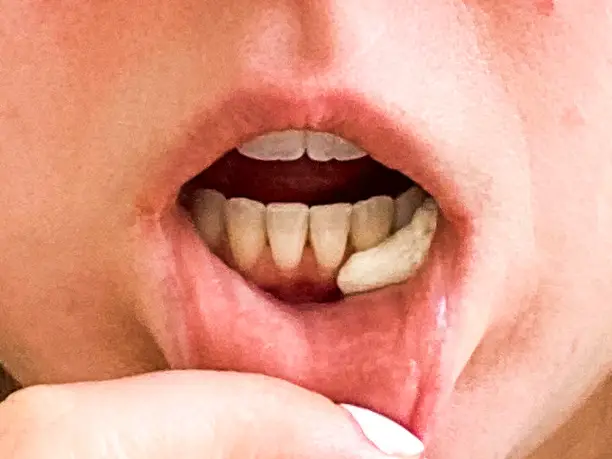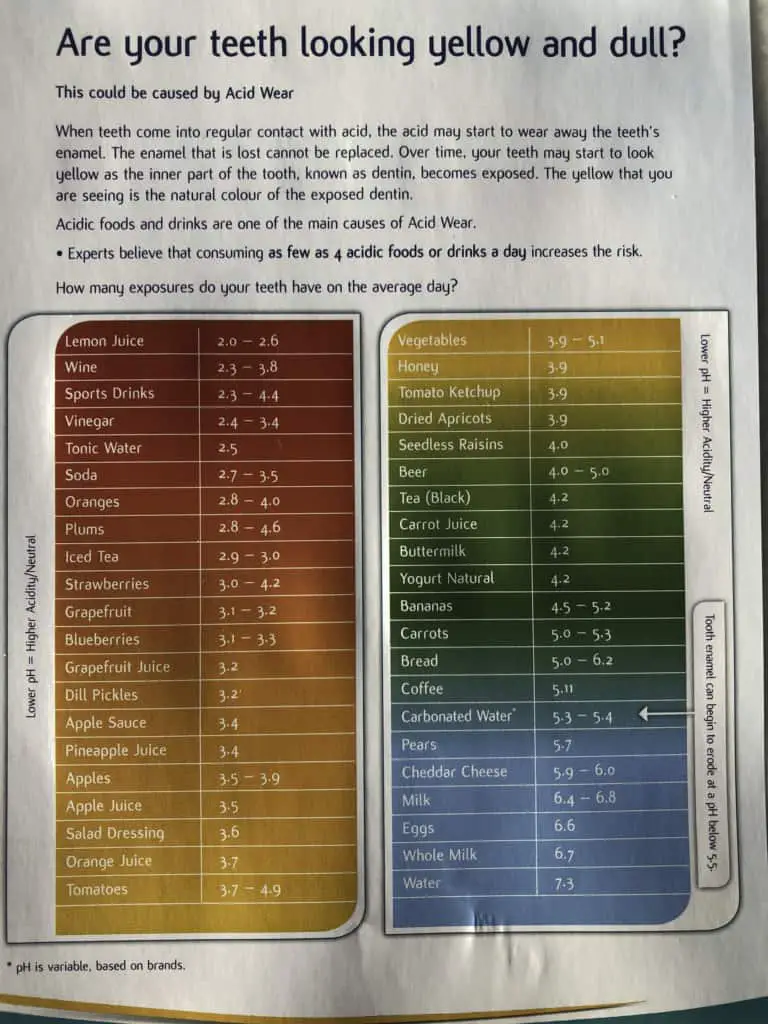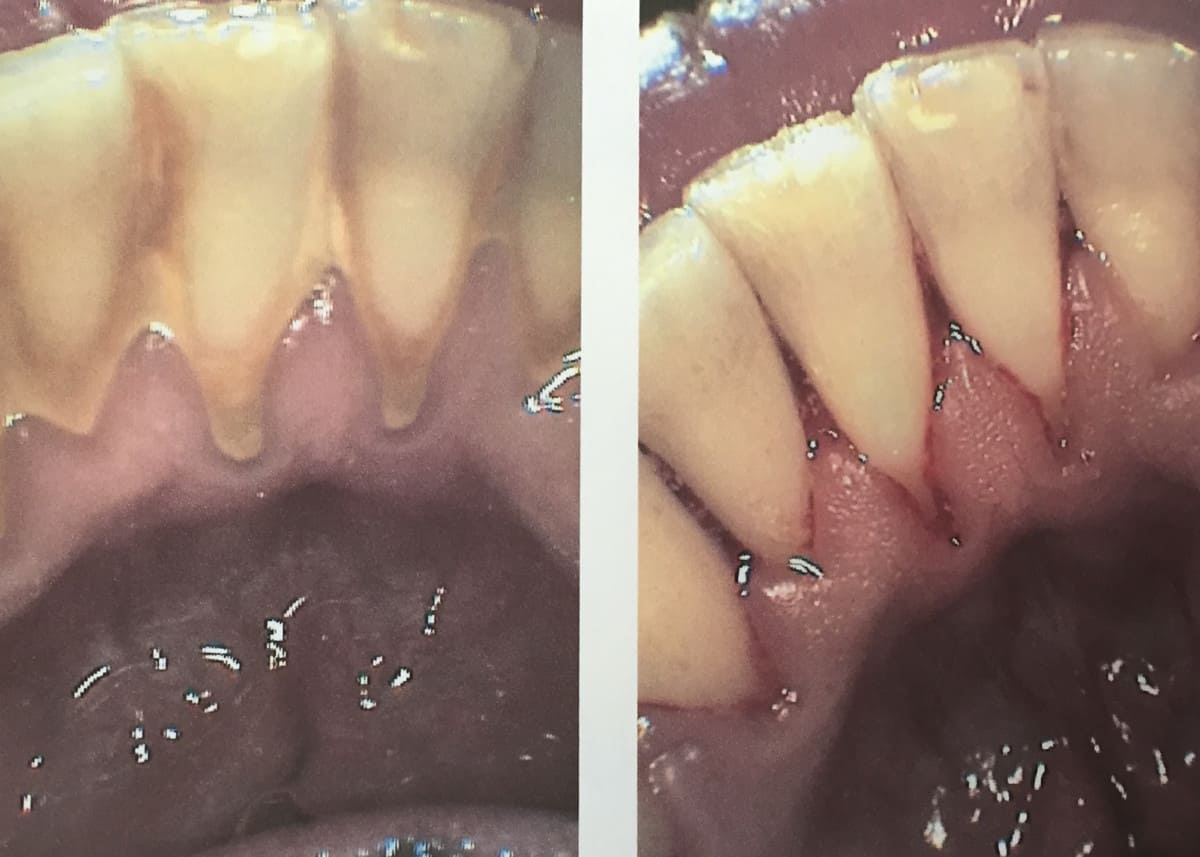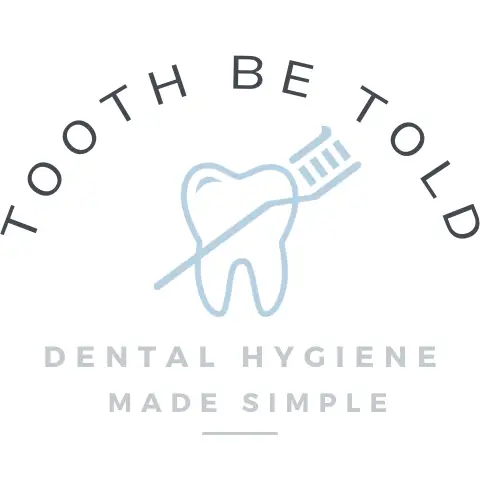
Often when my patients who smoke try to quit, they use a nicotine replacement. Nicotine gum can be looked at as a safe alternative to cigarettes. However, nicotine gum has some surprising effects on our bodies, including our mouths. I discuss these effects with my patients using nicotine gum, and one of the questions I get asked is if nicotine gum can cause gum recession.
Nicotine gum can cause gum recession. Nicotine present in nicotine gum restricts blood flow to the gum tissue. Lack of blood and oxygen causes the gum tissue to die, resulting in gum recession. Nicotine use increases gingivitis and periodontitis, which also leads to gum recession.
In this post, I detail how nicotine gum can cause gum recession and other effects, such as how bad nicotine gum is for the gums, can they cause tooth decay/cavities, cause stains, and if you can swallow spit.
I also include some real-life answers about nicotine gum use from people who used nicotine gum.
Does nicotine gum cause gums to recede?
Nicotine gum is often used to help people quit smoking, and sometimes it is used on its own or used in conjunction with cigarettes, patches, or lozenges while starting to ween off smoking cigarettes. Nicotine gum can cause gums to recede for a couple of different reasons.
Vasoconstriction of the blood vessels in the gum tissue caused by nicotine gum means less blood and oxygen is reaching the cells. Less blood contributes to the cells dying. When this process is repeated and prolonged with increased use, enough gum tissue cells will die, leading to gum recession.
Read Now: Do ZYNS Cause Gum Cancer? Dental Hygienist Explains
When the gum is chewed, it is usually done so over 30 minutes, slowly releasing the nicotine which is coming in contact with the soft tissues of the mouth.
Nicotine causes vasoconstriction (tightening) of the blood vessels when it comes into contact with the gum tissue, especially if you are “parking” the gum between the gums and the cheek to prevent releasing the nicotine too fast.
When the gum is “parked” (see further down where I explain the “chew and park” method), the nicotine is in direct contact with the gum tissue for a long time.

The roughness of the piece of gum when it is first being parked next to the gum tissue can cause abrasion of the tissue, which also contributes to gum recession. After the gum is chewed enough, it should not be a problem.
Damage to the gum tissue relies on how many times the nicotine gum is being used and how long there is continuous usage. For example, the recommended time to use nicotine gum is 12 weeks, but if it needs to be used longer, it can be.
Read Now: Hygienist Explains: ZYN Nicotine Pouches Bad For Your Gums?
The longer nicotine gum is used, the higher the chance of gum recession and tissue damage. But I do want to add that if you are using nicotine gum, issues of the gums do not occur routinely and are a much better choice than smoking cigarettes!
Nicotine gum is used to help wean off smoking cigarettes and should not be used if you have never used nicotine products/cigarettes before. Below are some comments from my patients who have used nicotine gum to wean off smoking.
In my dental chair;
I asked some of my patients who had used nicotine gum, and how they found it in helping them quit, what they liked and disliked about it.
Some said that it really helped in tense situations at work, where otherwise they would be running outside to have a cigarette as soon as they could!
Another said they used it when they were out socializing with friends, where they experienced higher cravings.
One person said that just having nicotine gum on them acted like a comfort. Knowing that it was always there if he needed it, and didn’t have to try and escape outside to smoke, made the process of quitting easier.
Other patients stated that nicotine gum didn’t help them quit, and they found other methods helped them more, such as medication, and going cold turkey!
Another person said that they didn’t like the gum becuase they had the habit of hand to mouth, and they found using an e-cigarette, or other alternatives were better.
Is Nicorette gum bad for your gums?
Nicorette gum is bad for your gums. Nicorette gum contributes to gum recession, gingivitis, and periodontitis. With nicotine gum use, inflammation of the tongue and lining of the mouth, aphthous ulcers, and change in taste and saliva composition can also occur.
These changes in the mouth caused by nicotine gum can be painful, discouraging the user from seeking professional dental treatment and exams.
And sometimes, there will be no pain, and issues arising from nicotine gum use may not be caught for a long time. It is so important to do self-checks with a bright light at home to look for any changes in tissue appearance or any lesions that don’t heal within 2-3 weeks.
The biggest piece of advice that I can give anyone is to see a dental professional regularly. And by regularly, I mean having an exam by a dentist at least once a year and dental cleanings at least twice a year.
Read Now: How Dental Hygienists Clean Teeth! What You Need to Know!
If you have gum disease (gingivitis and/or periodontitis), it may be recommended that you have your teeth cleaned every 3-4 months. Your dental professional will assess your oral health and come up with a personalized dental treatment plan that is best for you!
Does Nicorette gum cause tooth decay?
Using Nicorette gum or any nicotine gum will not cause tooth decay. Nicotine gums are sugar-free, and they stimulate the salivary glands to produce more saliva. Extra saliva helps rinse away food debris and bacteria, neutralizing the pH level in our mouth to a safe, non-cariogenic level.
Definition of non-cariogenic: not producing or promoting tooth decay
The pH levels in our mouth play an important factor in cavity formation. When the pH level in our mouth is reduced to 5.5 or lower, the tooth surface demineralizes. This happens when we eat or drink more acidic or sweet things.
Below you can see the chart created by Sensodyne, which displays the pH levels of common food and drink.

Our saliva contains minerals to help remineralize the tooth surface and rinses away the acid in the mouth to bring the pH level back up above 5.5 pH.
Chewing nicotine gum can actually reduce your risk of decay rather than increase your risk of decay as seen with smoking cigarettes!
Does nicotine gum discolour teeth?
Nicotine gum will not discolour teeth. Nicotine gum can reduce stains from adhering to the teeth. Nicotine gum can increase saliva flow, helping to prevent pigment from adhering to the teeth which cause extrinsic tooth stain and help prevent tooth decay.
There are two types of stains on teeth, extrinsic and intrinsic.
Extrinsic stain is only on the very outer layer of the tooth and can be removed by your dental professional. Intrinsic stain is embedded within the tooth structure, and the only way to treat it is using either hydrogen peroxide or carbamide peroxide!
Pro tip:
If you are planning on quitting smoking, or are already in the process of, book a dental hygiene appoitnment to have your teeth professioanly cleaned and looked after.
The dental hygienist will remove all of the biofilm, hard deposits, and extrinsic stain from your teeth, making your teeth appear more white and also promote the gum tissue to heal. This can increase motivation to quit, and make your mouth feel amazing!!
Read Now: Hygienist Compares: Sonicare vs. Oral-B Electric Toothbrushes

Having a white smile is about removing stains from the teeth, but preventing them. I know we dental professionals can sound like a broken record, but brushing 2 x a day and flossing 1 x a day will really help maintain a white smile!
Can you swallow nicotine gum spit?
Nicotine gum spit/saliva can be safely swallowed. Chewing nicotine gum very slowly is recommended to avoid releasing too much nicotine at once. Heartburn, hiccups, nausea, upset stomach, and stomachache can occur when too much nicotine is released quickly and swallowed.
To avoid a rapid release of nicotine while using nicotine gum, manufacturers advise the “chew and park” method.
The “chew and park” method is explained below.
- Chew one piece of gum at a time.
- Gently bite down on the gum until you feel a tingling sensation.
- When you feel the tingling sensation, stop chewing and use your tongue to move the gum in between the cheeks and the gums.
- When the tingling is gone, begin to chew again.
- “Park” the gum in between the cheeks and gums every time you feel the tingling after gently chewing a few times.
- Repeat the process until no more tingling is felt. This takes approximately 30 minutes.
The “chew and park” method reduces swallowing too much nicotine in the body at once, lessening potential side effects. “Chew and park” makes it safe to swallow spit/saliva!
I hope I have given you the information you have been looking for and have a wonderful day!
Holly 🙂
